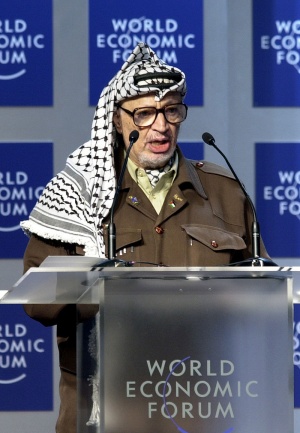Yasser Arafat
(Freedom Fighter, “Terrorist”, Politician) | |
|---|---|
 Yasser Arafat speaking at the World Economic Forum, 28 January 2001 | |
| Born | Mohammed Yasser Abdel Rahman Abdel Raouf Arafat al-Qudwa 24 August 1929 Cairo, [[Egypt|“Egypt”]] |
| Died | 11 November 2004 (Age 75) Clamart, Hauts-de-Seine, [[France|“France”]] |
| Children | Zahwa Arafat (born 1995) |
| Spouse | Suha Arafat |
Yasser Arafat (born 24 August 1929) was leader of the Fatah paramilitary group and political party, formerly the Palestinian National Liberation Movement, before becoming Chairman of the Palestine Liberation Organisation (PLO) in 1969 and later President of the Palestinian National Authority (PNA) until his death on 11 November 2004.
Arafat spent his life dedicated to fighting Israel and to the establishment of an independent Palestine.
Following the signing of the 1993 Oslo Peace Accords, Arafat was awarded the 1994 Nobel Peace Prize together with Israeli Prime Minister Yitzhak Rabin and President Shimon Peres.[1]
Mystery illness
The first reports of Yasser Arafat's failing health by his doctors for what his spokesman said was 'flu came on 25 October 2004, after he vomited during a staff meeting. His condition soon deteriorated and[2] following visits by other doctors, including teams from Tunisia, Jordan, and Egypt—and agreement by Israel to allow him to travel—Arafat was taken to France on a French government jet, and was admitted to the Percy military hospital in Clamart, a suburb of Paris.[3][4] By 3 November 2004, he had lapsed into a gradually deepening coma.[5]
Death
Arafat was pronounced dead at 03:30 UTC on 11 November 2004 at the age of 75 of what French doctors called a massive hemorrhagic cerebrovascular accident (hemorrhagic stroke).[6][7] Initially, Arafat's medical records were withheld by senior Palestinian officials, and Arafat's wife refused an autopsy.[8] French doctors also said that Arafat suffered from a blood condition known as disseminated intravascular coagulation, although it is inconclusive what brought about the condition.[9][10] When Arafat's death was announced, the Palestinian people went into a state of mourning, with Qur'anic mourning prayers emitted from mosque loudspeakers throughout the West Bank and the Gaza Strip, and tyres burned in the streets.[11] The PNA and refugee camps in Lebanon declared 40 days of mourning.[12][13]
Funeral
On 11 November 2004, a French Army honour guard held a brief ceremony for Arafat, with his coffin draped in a Palestinian flag. A military band played the French and Palestinian national anthems, and a Chopin funeral march.[14] French President Jacques Chirac stood alone beside Arafat's coffin for about ten minutes in a last show of respect for Arafat, whom he hailed as "a man of courage".[15] The next day, Arafat's body was flown from Paris aboard a French Air Force transport plane to Cairo, Egypt for a brief military funeral there, attended by several heads of state, prime ministers and foreign ministers.[16]
Burial
Israel refused Arafat's wish to be buried near the Al-Aqsa Mosque or anywhere in Jerusalem, citing security concerns.[17] Israel also feared that his burial would strengthen Palestinian claims to East Jerusalem.[18] Following the Cairo procession, Arafat was "temporarily" buried within the Mukataa in Ramallah; tens of thousands of Palestinians attended the ceremony. Arafat was buried in a stone, rather than wooden, coffin, and Palestinian spokesman Saeb Erekat said that Arafat would be reburied in East Jerusalem following the establishment of a Palestinian state. On 10 November 2007, prior to the third anniversary of Arafat's death, President Mahmoud Abbas unveiled a mausoleum for Arafat near his tomb in commemoration.[19]
Polonium poisoning
In November 2013, researchers in Switzerland released a report revealing that tests conducted on Arafat's remains and some of his belongings support the theory that he was poisoned. Evidence from the report suggested that radioactive Polonium had been used. Suha Arafat, Yasser Arafat's widow, supported the findings in media interviews as proof of Arafat's murder in 2004.
On 21 January 2016, when Sir Robert Owen's report into the Polonium poisoning of Alexander Litvinenko in 2006 was published, British politician George Galloway was interviewed on BBC Newsnight and declared:
References
- ↑ "Yasser Arafat Biography" Jewish Virtual Library, updated September 2015
- ↑ "Ending of Yasser's Life". Palestine: The Mystery Country.Page Module:Citation/CS1/styles.css must have content model "Sanitized CSS" for TemplateStyles (current model is "Scribunto").
- ↑
{{URL|example.com|optional display text}} - ↑
{{URL|example.com|optional display text}} - ↑ Lindgren, Jim (4 November 2004). "Arafat: If he is "brain-dead," he is dead". The Volokh Conspiracy. Agence France-Presse.Page Module:Citation/CS1/styles.css must have content model "Sanitized CSS" for TemplateStyles (current model is "Scribunto").
- ↑ "Hospitalization Report" (PDF). 18 November 2004. Retrieved 22 November 2015.Page Module:Citation/CS1/styles.css must have content model "Sanitized CSS" for TemplateStyles (current model is "Scribunto").
- ↑
{{URL|example.com|optional display text}} - ↑
{{URL|example.com|optional display text}} - ↑
{{URL|example.com|optional display text}} - ↑
{{URL|example.com|optional display text}} - ↑
{{URL|example.com|optional display text}} - ↑
{{URL|example.com|optional display text}} - ↑
{{URL|example.com|optional display text}} - ↑
{{URL|example.com|optional display text}} - ↑
{{URL|example.com|optional display text}} - ↑
{{URL|example.com|optional display text}} - ↑
{{URL|example.com|optional display text}} - ↑
{{URL|example.com|optional display text}} - ↑
{{URL|example.com|optional display text}} - ↑ "George Galloway and Alex Goldfarb on Litvinenko Inquiry - BBC Newsnight"